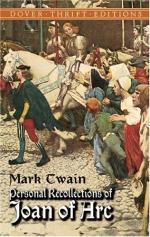“As the Voices have told you you are going to Paradise, you feel certain that that will happen and that you will not be damned in hell. Is that so?”
“I believe what they told me. I know that I shall be saved.”
“It is a weighty answer.”
“To me the knowledge that I shall be saved is a great treasure.”
“Do you think that after that revelation you could be able to commit mortal sin?”
“As to that, I do not know. My hope for salvation is in holding fast to my oath to keep by body and my soul pure.”
“Since you know you are to be saved, do you think it necessary to go to confession?”
The snare was ingeniously devised, but Joan’s simple and humble answer left it empty:
“One cannot keep his conscience too clean.”
We were now arriving at the last day of this new trial. Joan had come through the ordeal well. It had been a long and wearisome struggle for all concerned. All ways had been tried to convict the accused, and all had failed, thus far. The inquisitors were thoroughly vexed and dissatisfied.
However, they resolved to make one more effort, put in one more day’s work. This was done—March 17th. Early in the sitting a notable trap was set for Joan:
“Will you submit to the determination of the Church all your words and deeds, whether good or bad?”
That was well planned. Joan was in imminent peril now. If she should heedlessly say yes, it would put her mission itself upon trial, and one would know how to decide its source and character promptly. If she should say no, she would render herself chargeable with the crime of heresy.
But she was equal to the occasion. She drew a distinct line of separation between the Church’s authority over her as a subject member, and the matter of her mission. She said she loved the Church and was ready to support the Christian faith with all her strength; but as to the works done under her mission, those must be judged by God alone, who had commanded them to be done.
The judge still insisted that she submit them to the decision of the Church. She said:
“I will submit them to Our Lord who sent me. It would seem to me that He and His Church are one, and that there should be no difficulty about this matter.” Then she turned upon the judge and said, “Why do you make a difficulty when there is no room for any?”
Then Jean de la Fontaine corrected her notion that there was but one Church. There were two—the Church Triumphant, which is God, the saints, the angels, and the redeemed, and has its seat in heave; and the Church Militant, which is our Holy Father the Pope, Vicar of God, the prelates, the clergy and all good Christians and Catholics, the which Church has its seat in the earth, is governed by the Holy Spirit, and cannot err. “Will you not submit those matters to the Church Militant?”
“I am come to the King of France from the Church Triumphant on high by its commandant, and to that Church I will submit all those things which I have done. For the Church Militant I have no other answer now.”




